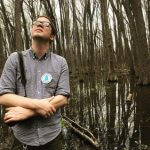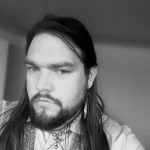Dani Lindamood
Guelph, Ontario
Dani Lindamood has worked across multiple sectors, including social enterprise, academia, and the nonprofit sector, but water is always at the heart of what she does. Originally from California, Dani moved to southern Ontario in 2015 to pursue her masters degree in Sustainability Management with an emphasis on water at the University of Waterloo. After spending a couple years in academia, she began working with the Wellington Water Watchers as a consultant in 2019, supporting research & science communications initiatives, then transitioned to a permanent role as the Program Manager later in 2020. Every day is different with the Water Watchers, but education, mobilization, and celebration for water grounds her work. When she’s not on the clock, Dani can be found enjoying a craft beer by a roaring fire, soaking in the wonders of nature, traveling off the beaten path, or laughing in conversation & connection with her people.
This interview was conducted by Carly Schmidt on January 25, 2021. Learn more about Dani’s work at Wellington Water Watchers.
What is your role at Wellington Water Watchers?
I really get to be a Jane-of-All-Trades. I am the Program Manager with the Wellington Water Watchers (WWW) and we’re just a team of four, so we all wear a lot of different hats. My responsibilities are mainly focused on program support: things like helping with the design of any initiatives, grant writing, and website support. I also do some general storytelling, writing, and reporting for our organization, as well as fundraising and member engagement. Every day is different, which makes it super energizing.
WWW was founded in 2007 and I’ve been with the organization for about a year and a half now. The organization was founded as a small group of local citizens in Guelph, Ontario that saw an injustice happening with water bottling and really took up that cause. The organization has come a long way since then!
What are some of the major campaigns that WWW has taken up recently?
We celebrated a couple big wins in 2020 with a few of our campaigns. We have been fighting Nestle, who is not only the water bottling company in this area, but also a global Leviathan. What we are really doing is empowering communities, and the community was not happy with Nestle’s presence. Nestle committed to leaving North America this year, which we won’t take full responsibility for, but there have been a lot of people advocating for this and we have definitely been a big thorn in their side. Right now, we’re just keeping a finger on the pulse of that situation and celebrating that win for the community.
We are also supporting a group called ACTION Milton that is fighting a quarry proposal that the community does not want. They have been fighting against the quarry for a couple years now and we just got some big news that the quarry will be subject to an environmental assessment, which is only the second time that has happened in the history of aggregate applications in Ontario. It’s a step in the right direction.
We’ve helped with a bunch of different aggregate applications and resistances in the past and some have been successful and some have not. Overall, we want to figure out how to take the onus off of these individual communities who keep having to fight these fights in their backyards and move the fight to the provincial regulators.
It sounds like you’ve been very successful in mobilizing communities. How do you rally communities around these issues?
First, our campaign director Mike Balkwill is the reason that all of these campaigns get off the ground so effectively, but outside of that, the drive and desire to act on a situation has to come from within the community. We’re not going into spaces and asking people to care about the Xinyi glass plant proposal in Stratford - people are coming to us and asking for help. I think that fire can only come organically from a community, then we help to fan the flames.
Fundraising is so essential to this community-led work, too. You have to be able to have some money to put towards a communication strategy or expert opinions like legal or different environmental assessments. It all costs money and people don’t usually think about that. It’s also not cheap! But if we can organize communities to contribute a small amount per person, that’s a huge deal. We also help connect these individual communities with our broader network of supporters & funders, which helps lighten the load.
Understanding the localized context is a big part of mobilization, too. For example, Stratford, Ontario, where we are fighting the Xinyi float glass plant proposal, is not an industrial city. It is an arts city, so that mismatch really matters to them. Their identity as this small, quaint city doesn’t match at all with the 30-meter smokestacks that would come with the glass plant, and they don’t want that to be their legacy. I think our Campaign Director, Mike, would say that goal setting is a big part of mobilization, too.
How do you set goals around such huge community issues?
Before engaging with any group, Mike will always ask, “What does winning look like?” and he works backward and determines the steps we need to take to get there. There’s a bit of goal negotiating as well because everyone doesn’t always agree on the end goal.
You were one of the recipients of River Network development support for a drinking water campaign. How did that campaign transform after COVID hit?
We were granted support in February 2020 and we had conceptualized something that we were calling the People’s Water Tribunal. We were seeing all these grassroots fights happening and wondering how we could elevate that work. We wanted to mobilize all the available capacity for water protection with intersectional environmental and social movements in order to make some concerted progress toward our collective water goals in the province.
We had a bunch of ideas and were thinking we would go into communities and do facilitated focus groups. The idea was that we would ask about their priorities, discuss capacity building, and connect them with other organizations. Then the pandemic hit and we were forced to go fully online. We knew that this idea wouldn’t work the same way in the digital space, so we brainstormed how to bring people into a different kind of conversation around key water issues in Ontario.
We ended up scrapping the idea that River Network initially funded. I would say that a huge portion of what we were able to do was because of River Network saying, “We understand that things are not the same and we trust you to re-think this in any way you need to.” That gave us the freedom to transition those funds to a similar but new program without limitations.
We ultimately transitioned to the People’s Water Campaign, with a three-series approach to launching the project. The first had an educational focus, where we facilitated water webinars and hosted dialogues. The next step was bringing organizations into this process. We partnered with a professor at the University of Waterloo, who is also our board chair, and interviewed people from 30 different organizations, including WWF and the David Suzuki Foundation, Indigenous communities and other local organizations. We’re still in the process of analyzing where these organizations are at, but it was really helpful to hear where water lies as a priority for these groups, what water issues are the most important to them, and what capacity they have to work together.
And the final piece of this three-part series of the People’s Water Campaign was bringing all these people together. This led us to write a draft water justice statement for Ontario, which is an invitation to move toward water justice and recognizing that it’s a journey, but one we all need to take together.
The invitation and the journey toward water justice were the focus of our big digital convention, “Watershed 2020” which was successful beyond our wildest expectations. We started with a keynote, we had 12 workshop sessions, we brought in political representatives from every party to respond to a list of 10 water questions, and we had some musical performances to bring some celebration into the event. We had over 300 people participate over the course of the day which was incredible.
It was truly wild moving completely from in-person work to the virtual world, especially because our membership is a little bit older, but it’s been amazing to watch how our work has been elevated through this time in ways that we didn’t think possible.
How did you come into this community organizing work?
I studied international relations and development in my undergraduate program. I always really cared about injustice from that perspective: how different life could be for someone who lived a few blocks from me versus a continent away from me just because of where they were born. In my last semester of undergrad, I took a course in water resources that really shifted my thinking about what true injustice looks like and how much of it is balanced with natural resources. Making that connection between human well-being and environmental protection was a really powerful moment for me, and water as a focus was even more compelling for me because it was such an accessible bridge. It can sometimes be difficult to connect environmentalism to what it means for your own lifestyle, but everyone understands how interwoven water is into our daily lives.
That was the moment I knew that water was the place that I wanted to dedicate my time. That realization led me to an internship in The Gambia with Agua Inc. After that, I started looking for interdisciplinary water programs and I came across the University of Waterloo and their sustainability management degree program. I was accepted and then also did a certificate program with the Water Institute at University of Waterloo called the Collaborative Water Program and it was an amazing experience to work with people from around 40 different programs across the university that all worked on water in some way or another.
When I graduated, I consulted in academia for a while and then found Wellington Water Watchers. Their approach really spoke to my heart on so many levels because, at the end of the day, a lot of what we do is confronting injustice and resisting the commodification of water, especially by corporate powers who do not have these communities in mind. I feel honored to dedicate my skills and passion to WWW’s work and I’m excited to see where the next few years take us.







